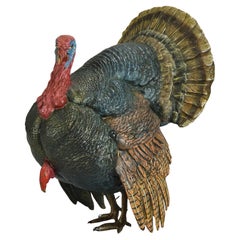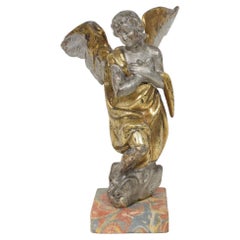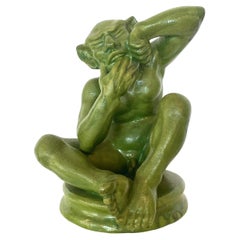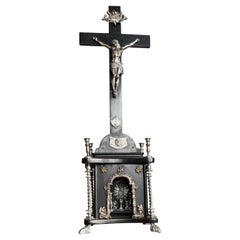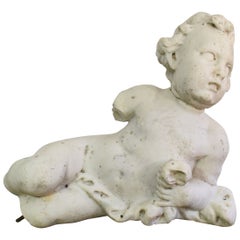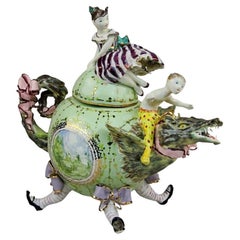Europe Figurative Sculptures
to
1,075
6,134
1,342
261
596
1,608
3,930
1,603
1,050
1,487
854
118
88
294
346
154
246
250
270
161
107
909
741
686
250
217
189
149
109
99
64
52
31
26
24
23
20
11
6
3,061
2,149
1,957
1,394
1,229
7,737
7,608
6,520
1,831
1,776
530
411
Height
to
Width
to
7,737
6,720
7,146
154
131
100
69
58
Item Ships From: Europe
Early 20th Century Cold-Painted Austrian Bronze "Turkey" by Franz Bergman
By Franz Bergmann
Located in London, GB
An impressive early 20th Century Austrian bronze study of a standing turkey with very fine naturalistic cold painted colours and excellent hand finished surface detail. Signed with t...
Category
Early 20th Century Austrian Late Victorian Europe Figurative Sculptures
Materials
Bronze
Italian 18th Century Hand Carved Baroque Winged Angel
Located in Buisson, FR
Wonderful Hand carved winged angel.
Italy, circa 1750-1800
Weathered small losses and old repairs.
Measurement here below inclusive the wooden base.
Category
18th Century Italian Baroque Antique Europe Figurative Sculptures
Materials
Wood
$832 Sale Price
49% Off
Exclusive Danish early 20th century sculpture of large green glazed goblin
Located in Ebberup, DK
Original antique large unique sculpture of goblin made by Danish artist Anders Møller.
Anders Møller resided on Funen and was born in 1890. He was a member of Danish artist group “Germinalen”, a part of the art and ceramic movement in Denmark at that time. The sculpture is estimated to be from the 1930s.
This mythical, grotesque creature has exaggerated features and is possibly influenced by European Gothic or Art Nouveau aesthetics. The expression also has a resemblance to the work of earlier artist such as Niels Hansen Jacobsen...
Category
Early 20th Century Danish Art Nouveau Europe Figurative Sculptures
Materials
Ceramic, Clay, Stoneware
Antique Altar Crucifix Detailed Silvered Bronze Sculpture of Christ & Monstrance
Located in Lisse, NL
Unique table crucifix and a wonderful work of religious art.
For us the most powerful statement will always be 'the truth will set you free'. It is what we have learned most from th...
Category
Mid-19th Century European Gothic Revival Antique Europe Figurative Sculptures
Materials
Silver, Bronze
Large 17/18th Century Italian Carved Carrara Marble Baroque Angel Fragment
Located in Buisson, FR
Beautiful weathered marble baroque angel.
Italy 17/18th century. Weathered, losses and old repairs.
More pictures are available on request.
Category
17th Century Italian Baroque Antique Europe Figurative Sculptures
Materials
Carrara Marble
$6,889 Sale Price
27% Off
Set of New 6 Handmade Teapots Madeinitaly Alice in Wonderlands Style
Located in San Miniato PI, IT
Wonderful set of 6 handmade teapots, carefully realized by an italian artist with love and passion.
Unique and exclusive pieces.
The set includes only teapots.
Cups and plates a...
Category
2010s Italian Europe Figurative Sculptures
Materials
Gold Leaf
$7,600 Sale Price / set
20% Off
Antique " Good Night " Italy Alabaster Girl Sculpture Table Lamp by U. Stiaccini
By Umberto Stiaccini
Located in Lisse, NL
Enchanting antique sculpture of a girl on the stairs holding a light, by Umberto Stiaccini, Florence circa 1910.
This beautiful and truly elegant, sculptural table or desk lamp is...
Category
Early 20th Century Italian Arts and Crafts Europe Figurative Sculptures
Materials
Alabaster, Brass
Rudolf Marcuse - The Swordsman, Bronze, Germany (Berlin), circa 1910
By Gladenbeck’s Bronzegiesserei
Located in Greven, DE
Rudolf Marcuse - The Swordsman
Germany (Berlin)
bronze, marble
circa 1910
Dimensions: H x W x D: 24 x 19 x 6 cm
Description:
Bronze figure standing on a two-tiered base made of bl...
Category
Early 20th Century German Art Nouveau Europe Figurative Sculptures
Materials
Marble, Bronze
Lips Aldebaran Sculpture
By Stefania Boemi
Located in Milan, IT
Entirely handmade sculpture with a mixture of cements and volcanic sands from Etna and rose quartz. The deliberately-made porous texture and uneven colour is the result of a pigmenta...
Category
2010s Italian Europe Figurative Sculptures
Materials
Cement
$1,317 / item
Bjørn Wiinblad. “Autumn” figure in blue glazed earthenware. Dated 1968
Located in København, Copenhagen
Pre-owned goods are exempt from import duties for U.S. customers.
Therefore, no import tariffs will be applicable to your purchase.
Bjørn Wiinblad (1918-2006).
“Autumn” from the s...
Category
1960s Danish Scandinavian Modern Vintage Europe Figurative Sculptures
Materials
Ceramic
Decorative Kokeshi Doll Sculpture from Northern Japan, Hand-Painted, Signed
Located in Vienna, AT
A beautiful and exceptionally 19 inches tall classic traditional Kokeshi doll from Northern Japan. Handcrafted of wood and hand-painted in the early 20th century, covered with a layer of wax. Signed by the artist on its underneath. In good condition with charming patina. A classic traditional doll with a simple but lovely design, a decorative piece. In Japan these dolls symbolize love, friendship and believed to be a lucky charm. We offer more large Kokeshi...
Category
Early 20th Century Japanese Edo Europe Figurative Sculptures
Materials
Wood
Italian 18th Century Hand Carved Wooden Baroque Angel Fragment
Located in Buisson, FR
Beautiful hand carved Baroque angel fragment. Unique period piece with traces of its old color .
Italy, circa 1750
Weathered. small losses.
Measurement here below includes the wood...
Category
18th Century Italian Baroque Antique Europe Figurative Sculptures
Materials
Wood
$892 Sale Price
44% Off
Early 20th Century Cold-Painted Bronze entitled "Bella" by Josef Lorenzl
By Josef Lorenzl
Located in London, GB
An attractive early 20th Century Art Deco cold painted bronze figure of a young energetic beauty in a dancing pose, exhibiting excellent colour and very fine hand chased surface deta...
Category
Early 20th Century Austrian Art Deco Europe Figurative Sculptures
Materials
Onyx, Bronze
Peter Tereszczuk Viennese Figural Bronze Sculpture, circa 1910
By Peter Tereszczuk
Located in Bishop's Stortford, Hertfordshire
A charming antique Viennese bronze sculpture of a young Dutch boy pulling in a fishing net by Peter Tereszczuk dating from circa 1910. The f...
Category
1910s Austrian Art Nouveau Vintage Europe Figurative Sculptures
Materials
Bronze
Large Terracotta Garden Gnome with Flower Pot, Germany ca. 1920s
Located in Berghuelen, DE
Large Terracotta Garden Gnome with Flower Pot, Germany ca. 1920s
A large garden gnome from Germany, ca. 1920s. The gnome holds a flower pot. Good used antique condition with signs o...
Category
Early 20th Century German Victorian Europe Figurative Sculptures
Materials
Terracotta
Vintage Decorative Figure of Moses, English, Bronze, Statue, After Michelangelo
Located in Hele, Devon, GB
This is a vintage decorative figure of Moses. An English, bronze and marble statue after Michelangelo, dating to the mid 20th century, circa 1960.
Striking rendition of a historic...
Category
Mid-20th Century British Europe Figurative Sculptures
Materials
Bronze
Julius Paul Schmidt-Felling - The Archer, Bronze Sculpture, Germany, Berlin 1900
By Julius Schmidt-Felling
Located in Greven, DE
The Archer - Antique bronze sculpture by Julius Paul Schmidt-Felling
Dimensions: H x W x D: 32 x 10 x 12 cm
Description:
Bronze figure mounted on a cuboid base made of serpentine s...
Category
Early 20th Century German Europe Figurative Sculptures
Materials
Serpentine
Frederic Remington Bronze Sculpture – “The Mountain Man”, 20th Century
By Frederic Remington
Located in NICE, FR
This striking bronze sculpture, attributed to the legendary American artist Frederic Remington, captures the essence of the rugged frontier spirit with breathtaking motion and anatom...
Category
Mid-20th Century American American Classical Europe Figurative Sculptures
Materials
Marble, Bronze
Art Deco Crackle Glaze Ceramic Dancers, ca.1925
Located in Saint-Amans-des-Cots, FR
This captivating Art Deco ceramic group, dating from around 1925, features two cabaret dancers captured in mid-performance, mimicking a military march. The figures are beautifully ex...
Category
1920s European Art Deco Vintage Europe Figurative Sculptures
Materials
Ceramic
Gouged wooden Mushroom by Robert and Trix Haussmann, circa 1970
By Robert and Trix Haussmann
Located in VILLEURBANNE, FR
Mushroom hand-carved by Robert Haussmann for the interior design of a boutique in Zurich, circa 1970.
A key figure of postwar European design, Swiss architect and designer Robert Ha...
Category
Mid-20th Century Swiss Mid-Century Modern Europe Figurative Sculptures
Materials
Wood
Derby Exceptional Pair of Porcelain Figures of the Garland Shepherds, ca 1765
By Derby
Located in London, GB
This is a beautiful pair of Derby figures called the "Garland Shepherds", made in about 1765. The pair is one of Derby's most famous figure pairs and it bears the catalogue number E2...
Category
1760s English Rococo Antique Europe Figurative Sculptures
Materials
Porcelain
$1,160 Sale Price / set
20% Off
Rome Romulus Remus Souvenir Statue Sculpture on Marble Base Vintage Italy, 1960s
Located in Nuernberg, DE
A Rome 1960s Souvenir sculpture. Some wear with a nice patina, but this is old-age. Made of metal on a marble base. This was bought as a souvenir in Italy. A beautiful nice desktop item or just a display item...
Category
1960s Italian Vintage Europe Figurative Sculptures
Materials
Marble, Metal
French Art Nouveau Pair of Large Terracotta Vases Signed F. Citti, 1900-1910
Located in Frankfurt am Main, DE
A stunning French Art Nouveau pair of large vases with female figures of the era, signed by the Parisian Sculptor F. Citti, Paris 1900-1910.
Measures:
Height 19 in (48 cm)
Width...
Category
Early 20th Century French Art Nouveau Europe Figurative Sculptures
Materials
Terracotta
$1,418 Sale Price / set
20% Off
Sculpture of Venus in Resin and Metal Base, Medium-Sized Model.
Located in Saint-Ouen, FR
Sculpture of Venus in resin and metal base, medium-sized model.
Venus is the goddess of love, seduction and beauty in Roman mythology. She is the equivalent of the Greek goddess Aph...
Category
21st Century and Contemporary French Modern Europe Figurative Sculptures
Materials
Metal
Ares Sculpture
By Raffaello Romanelli
Located in Milan, IT
A stupendous representation of Ares, half-brother of Athens, son of Zeus and Hera, and the God of War, this sculpture will make a unique and sophisticated addition to a personal coll...
Category
2010s Italian Europe Figurative Sculptures
Materials
Other
$3,709 / item
A bronze statue of a ballerina
Located in Delft, NL
A bronze statue of a ballerina
A beautiful abstract statue of a ballerina made in bronze on a rectangular base. The bronze ballerina in a beautiful pose of a dancing jump, mounted...
Category
20th Century Dutch Europe Figurative Sculptures
Materials
Bronze
Contemporary "Picture White & Red", All Pieces Numbered, Handmade in Italy
By Mosche Bianche
Located in San Miniato PI, IT
Born in 1992 in Macerata in the Marche region, the Italian artist carried out a path that between studies of Surveyor and Architecture led him to a long collaboration with a craft co...
Category
2010s Italian Industrial Europe Figurative Sculptures
Materials
Acrylic, Polyester, Wood
$476 Sale Price / item
25% Off
Bitossi Aldo Londi Rimini Blue Horse, Italy, circa 1960s
By Bitossi
Located in Nuernberg, DE
A gorgeous character ceramic figural horse statue - Bitossi Aldo Londi. This character statue has been made in the 1960s. Absolutely gorgeous item with mark on the body and still in ...
Category
1960s Italian Mid-Century Modern Vintage Europe Figurative Sculptures
Materials
Ceramic
Rare and important painted bronze Crucifix after a model by Michelangelo
By Michelangelo Buonarroti
Located in Leesburg, VA
A rare and very fine bronze corpus of Christ after a model by Michelangelo, cast ca. 1597-1600 by Juan Bautista Franconio and painted in 1600 by Francisco Pacheco in Seville, Spain.
The present corpus reproduces a model attributed to Michelangelo. The best known example, lesser in quality, is one on display at the Metropolitan Museum of Art (MET).
The association of this corpus with Michelangelo was first brought to light by Manuel Gomez-Moreno (1930-33) who studied the wider circulated casts identified throughout Spain. The attribution to Michelangelo was subsequently followed by John Goldsmith-Phillips (1937) of the MET and again by Michelangelo expert, Charles de Tolnay (1960).
While Michelangelo is best known for his monumental works, there are four documented crucifixes he made. The best known example is the large-scale wooden crucifix for the Church of Santa Maria del Santo Spirito in Florence, made in 1492 as a gift for the Prior, Giovanni di Lap Bicchiellini, for allowing him to study the anatomy of corpses at the hospital there. In 1562, Michelangelo wrote two letters to his nephew, Lionardo, indicating his intention to carve a wooden crucifix for him. In 1563 a letter between Lionardo and the Italian sculptor Tiberio Calcagni, mentions this same crucifix (a sketch of a corpus on the verso of a sheet depicting Michelangelo’s designs for St. Peter’s Basillica [Palais des Beaux-Arts in Lille] may reproduce this). That Michelangelo was working on small corpora in the last years of his life is further evidenced by the small (26.5 cm) unfinished wooden crucifix located at the Casa Buonarroti, considered his last known sculptural undertaking. Michelangelo’s contemporary biographer, Giorgio Vasari additionally cites that Michelangelo, in his later years, made a small crucifix for his friend, Menighella, as a gift.
Surviving sketches also indicate Michelangelo’s study of this subject throughout his career, most notably during the end of his life but also during the 1530s-40s as he deepened his spiritual roots. The occasional cameo of crucified Christ’s throughout his sketched oeuvre have made it challenging for scholars to link such sketches to any documented commissions of importance. All the while, in consideration that such objects were made as gifts, it is unlikely they should be linked with commissions.
Nonetheless, a number of theories concerning Michelangelo’s sketches of Christ crucified have been proposed and some may regard the origin of the present sculpture. It has been suggested that the corpus could have its impetus with Michelangelo’s work on the Medici Chapel, whose exclusive design was given to the master. It is sensible smaller details, like an altar cross, could have fallen under his responsibility (see for example British Museum, Inv. 1859,0625.552). Others have noted the possibility of an unrealized large marble Crucifixion group which never came to fruition but whose marble blocks had been measured according to a sheet at the Casa Buonarroti.
A unique suggestion is that Michelangelo could have made the crucifix for Vittoria Colonna, of whom he was exceedingly fond and with whom he exchanged gifts along with mutual spiritual proclivities. In particular, Vittoria had an interest in the life of St. Bridget, whose vision of Christ closely resembles our sculpture, most notably with Christ’s proper-left leg and foot crossed over his right, an iconography that is incredibly scarce for crucifixes. The suggestion could add sense to Benedetto Varchi’s comment that Michelangelo made a sculpted “nude Christ…he gave to the most divine Marchesa of Pescara (Vittoria Colonna).”
Of that same period, two sketches can be visually linked to our sculpture. Tolnay relates it to a sketch of a Crucified Christ at the Teylers Museum (Inv. A034) of which Paul Joannides comments on its quality as suggestive of preparations for a sculptural work. Joannides also calls attention to a related drawing attributed to Raffaello da Montelupo copying what is believed to be a lost sketch by Michelangelo. Its relationship with our sculpture is apparent. Montelupo, a pupil of Michelangelo’s, returned to Rome to serve him in 1541, assisting with the continued work on the tomb of Pope Julius II, suggesting again an origin for the corpus ca. 1540.
The earliest firm date that can be given to the present corpus is 1574 where it appears as a rather crudely conceived Crucifixion panel, flanked by two mourners in low-relief and integrally cast for use as the bronze tabernacle door to a ciborium now located at the Church of San Lorenzo in Padula. Etched in wax residue on the back of the door is the date, 27 January 1574, indicating the corpus would have at least been available as a model by late 1573.
The Padula tabernacle was completed by Michelangelo’s assistant, Jacopo del Duca and likely has its origins with Michelangelo’s uncompleted tabernacle for the Basilica of St. Mary of the Angels in Rome.
The impetus for the Padula tabernacle’s Crucifixion panel begins with a series of late Crucifixion sketches by Michelangelo, depicting a scene of Christ crucified and flanked by two mourners (see British Museum Inv. 1895.0915.510; Ashmolean Museum Inv. 1846.89, KP II 343 recto; Windsor Castle RCIN 912761 recto; and Louvre Inv. 700). A faintly traced block possibly intended for sculpting the sketch of the crucified Christ on its recto was discovered by Tolnay on a version of the composition at Windsor Castle. The Windsor sketch and those related to it appear to have served as preparatory designs for what was probably intended to become the Basilica of St. Mary’s tabernacle door. Vasari documents that the project was to be designed by Michelangelo and cast by his assistant, Jacopo del Duca. Michelangelo died before the commission was complete, though on 15 March 1565, Jacopo writes to Michelangelo’s nephew stating, “I have started making the bronze tabernacle, depending on the model of his that was in Rome, already almost half complete.” Various circumstances interrupted the completion of the tabernacle, though its concept is later revitalized by Jacopo during preparations to sell a tabernacle, after Michelangelo’s designs, to Spain for Madrid’s El Escorial almost a decade later. The El Escorial tabernacle likewise encountered problems and was aborted but Jacopo successfully sold it shortly thereafter to the Carthusians of Padula.
An etched date, 30 May 1572, along the base of the Padula tabernacle indicates its framework was already cast by then. A 1573 summary of the tabernacle also describes the original format for the door and relief panels, intended to be square in dimension. However, a last minute decision to heighten them was abruptly made during Jacopo’s negotiations to sell the tabernacle to King Phillip II of Spain. Shortly thereafter the commission was aborted. Philippe Malgouyres notes that the Padula tabernacle’s final state is a mixed product of the original design intended for Spain’s El Escorial, recycling various parts that had already been cast and adding new quickly finished elements for its sale to Padula, explaining its unusually discordant quality, particularly as concerns the crudeness of the door and relief panels which were clearly made later (by January 1574).
Apart from his own admission in letters to Spain, it is apparent, however, that Jacopo relied upon his deceased master’s designs while hastily realizing the Padula panels. If Michelangelo had already earlier conceived a crucifix model, and Jacopo had access to that model, its logical he could have hastily employed it for incorporation on the door panel to the tabernacle. It is worth noting some modifications he made to the model, extending Christ’s arms further up in order to fit them into the scale of the panel and further lowering his chin to his chest in order to instill physiognomic congruence. A crude panel of the Deposition also follows after Michelangelo’s late sketches and is likewise known by examples thought to be modifications by Jacopo based upon Michelangelo’s initial sculptural conception (see Malgouyres: La Deposition du Christ de Jacopo del Duca, chef-d’oeuvre posthume de Michel-Ange).
Jacopo’s appropriation of an original model by Michelangelo for more than one relief on the Padula tabernacle adds further indication that the crucifix was not an object unique to Jacopo’s hand, as few scholars have posited, but rather belongs to Michelangelo’s original...
Category
16th Century Renaissance Antique Europe Figurative Sculptures
Materials
Bronze
Bronze Figurine Sculpture by or after Paul Philippe cold painted, Art Deco C1920
By Paul Philippe
Located in Lincoln, Lincolnshire
This is a cold painted bronze figurine of a Turkish dancer with a Parrot, by or after Paul Philippe, made in France in the Art Deco period, circa 1920 ....
Category
Early 20th Century French Art Deco Europe Figurative Sculptures
Materials
Onyx, Bronze
Rare Terracotta Stork for Garden Decoration, Germany ca. 1950s
Located in Berghuelen, DE
Rare Terracotta Stork for Garden Decoration, Germany ca. 1950s
Item e7304
A large stork sculpture made of terracotta, produced as a garden decoration by Heissner, Germany, ca. 1950s....
Category
Mid-20th Century German Victorian Europe Figurative Sculptures
Materials
Metal
Eskimo Boy and Eskimo Girl by Lladro, Design Juan Herta, Set of 2, Spain 1970s
By Lladro
Located in Bochum, NRW
Lladro Gres Eskimo Boy and Girl, Spain, 1970s.
Lladro gres ''Eskimo Boy'' and ''Eskimo Girl'' figurines.
Design by Juan Herta, issued in 1970, retired in 1...
Category
1970s Spanish Mid-Century Modern Vintage Europe Figurative Sculptures
Materials
Ceramic
Rare Terracotta Garden Gnome with Pig, Germany ca. 1920s
Located in Berghuelen, DE
Rare Terracotta Garden Gnome with Pig, Germany ca. 1920s
A large garden gnome manufactured by Heissner, Germany, ca. 1920s. The dwarf has grabbed a pig by the hind legs and is holdi...
Category
Early 20th Century German Victorian Europe Figurative Sculptures
Materials
Terracotta
1960s Yellow and Blue Cenedese Oval Murano glass bowl
By Cenedese
Located in Florence, Tuscany
A superb example of a 1960s oval sommerso (submerged glass) blue and yellow Murano glass bowl by the Venetian furnace Cenedese. In good condition with the original stickers intact.
Category
1960s Italian Vintage Europe Figurative Sculptures
Materials
Glass, Art Glass, Blown Glass
Bronze Sculpture - Green Jumping Frog
Located in Stockholm, SE
A lovely green bronze sculpture in shape of a jumping frog. The frog is 26 cm (10.4") tall and in excellent condition. Marked A.P.G below.
Category
2010s Swedish Scandinavian Modern Europe Figurative Sculptures
Materials
Bronze
Early 20th century hand carved pine architectural model
Located in London, GB
Early 20th century hand carved pine architectural model
A well modelled early 20th century hand carved pine architectural model of a rooftop corner. Showing natural age and minor lo...
Category
1920s British Late Victorian Vintage Europe Figurative Sculptures
Materials
Pine
Rosenthal, Germany. Octagonal porcelain bowl with iridescent glaze.
Located in København, Copenhagen
Rosenthal, Germany.
Octagonal porcelain bowl with iridescent, glossy glaze.
Hand-painted with fruits and butterflies.
1930s/40s.
Marked.
In perfect condition.
Dimensions: D 16.5 cm ...
Category
1930s German Vintage Europe Figurative Sculptures
Materials
Porcelain
Female torso sculpture on white Carrara marble -made in Italy original
By Laboratorio Todini
Located in Tarquinia, IT
Sculpture, Female torso, classical art, Greek art, Roman art, Torso, white Carrara marble, classical sculpture, ancient torso, Greek torso, Venus torso
Sculpted female torso on whit...
Category
Early 2000s Italian Greco Roman Europe Figurative Sculptures
Materials
Carrara Marble
Italian Ceramic Elephant Sculpture by Bruno Gambone, circa 1970s
By Bruno Gambone
Located in London, GB
Ceramic Indian motif white elephant by Bruno Gambone (circa 1970s). This is an absolutely charming ceramic white elephant with an Indian-style blanket and headdress, large whimsical ...
Category
1970s Italian Mid-Century Modern Vintage Europe Figurative Sculptures
Materials
Ceramic
$3,069 Sale Price
20% Off
Antique Mazarin Six Light Gilt Bronze Chandelier with Bacchus God of Wine Masks
Located in Lisse, NL
Beautiful quality, turn of the century craftsmanship pendant light.
This stunning bronze chandelier of practical size is in excellent condition. The top quality workmanship is unlik...
Category
Late 19th Century French Antique Europe Figurative Sculptures
Materials
Bronze
Award winning Bonsai "Wisteria falls", Handmade in Italy, Signed by the artist.
By Mosche Bianche
Located in San Miniato PI, IT
Unique piece sign by the artist.
The seasonal flowering of the wisteria, its scent, the pergolas to which it acts as a roof, gave the artist the inspiration for the creation of this...
Category
2010s Italian Modern Europe Figurative Sculptures
Materials
Aluminum
$4,265 Sale Price / item
20% Off
Capodimonte Sculpture Woman Vamp 1970s Italian Design Gold Black
By Capo Di Monte
Located in Palermo, Sicily
Porcelain of Capodimonte 1970s years Donna Vamp , totally handcrafted by skilled and skilled hands that have now disappeared, also painted by hand, with 24-karat pure gold dress, sig...
Category
1970s Italian Modern Vintage Europe Figurative Sculptures
Materials
Porcelain, Wood
$1,437 Sale Price
20% Off
Stoneware Clay, Unglazed Ceramic Ethereal Sculpture by Aleksandra Krasnopolska
Located in Geneve, CH
Stoneware Clay, Unglazed Ceramic Ethereal Sculpture by Aleksandra Krasnopolska
Dimensions: W 25.5 x D 19 x H 35 cm
Materials: Stoneware clay. Unglazed ceramic sulface.
Weight: 5,6 k...
Category
2010s Spanish Post-Modern Europe Figurative Sculptures
Materials
Ceramic, Clay, Stoneware
Figura di Bambin Gesù in Terracotta XVIII Secolo Arte Devozionale Italiana
Located in Milano, MI
Bambin Gesù in Terracotta della fine del 1700 raffigurato in piedi, privo di vesti, sopra una bella base dorata in oro fino. Italia centro-meridionale, risale alla fine del 1700. Il ...
Category
Mid-18th Century Italian Baroque Antique Europe Figurative Sculptures
Materials
Terracotta, Giltwood
Teak toy Vikings Kay Bojesen Denmark 1960s
By Kay Bojesen
Located in Den Haag, NL
Love this set of Three Vikings . all original from the sixties . One slightly
bigger . All complete with there armory . Very scary . Handmade .
Category
1960s Danish Mid-Century Modern Vintage Europe Figurative Sculptures
Materials
Teak
Pierre Koppe " 1931 - 2016 " Poetic Ceramic, Unique Work, circa 1979
Located in leucate, FR
PLAY BALL
Unique and poetic work.
Bird and Humans sculpture ceramic.
Made by a French sculptor, painter and ceramist, Pierre KOPPE.
Greige and cobalt blue color.
Signed on the back...
Category
1970s French Vintage Europe Figurative Sculptures
Materials
Ceramic
Rare Antique Gothic Corpus Christi 1480 -1530
Located in Doha, QA
An extraordinary and museum-worthy 15th century Gothic Corpus Christi, masterfully hand-carved in wood with exceptional anatomical detail and partially polychromed in white and royal...
Category
15th Century and Earlier German Gothic Antique Europe Figurative Sculptures
Materials
Wood
18th century Neapolitan Terracotta Santo Presepio Figure of Saint Anna
Located in Leesburg, VA
18th century Neapolitan Terracotta Santo Presepio Figure of Saint Anna
Anonymous
Naples, Italy; ca. 1760
Polychrome terracotta, wood, silk, gla...
Category
1760s Italian Baroque Antique Europe Figurative Sculptures
Materials
Terracotta, Silk, Glass, Wood
Art Deco Rare Porcelain Figurine, Flower Frog, Gunthersfeld, Germany, 1930s
Located in Bochum, NRW
Art Deco Rare Porcelain Figurine, Flower frog by the Porzellanfabrik Günthersfeld AG, Gehren, Germany 1930s. Rare find, this piece was made of porcelain trimmed in gold, it is in gre...
Category
1930s German Art Deco Vintage Europe Figurative Sculptures
Materials
Porcelain
$311 Sale Price
20% Off
Art Deco Italian Ceramic Animal Figurine Macaw Parrot Porcelain Bird Figure
By Capodimonte, Guido Cacciapuoti
Located in Wommelgem, VAN
Art Deco tall Italian animal Figurine Ceramic Parrot Macaw on a tree trunk
Material: porcelain, ceramic, tin glazed
Design: Cacciapuoti style...
Category
Mid-20th Century Italian Baroque Europe Figurative Sculptures
Materials
Ceramic, Majolica, Porcelain
Vintage Chinese Porcelain PROC Shou Lao Shiwan Figure, 1990/80s
Located in Amsterdam, Noord Holland
Lovely Chinese Shiwan Figure. Dating to the 1980’s or 90’s.
Additional information:
Material: Porcelain & Pottery
Decoration Type / Colour: Polychrome
Region of Origin: China
Period...
Category
20th Century Chinese Europe Figurative Sculptures
Materials
Porcelain
Rene Lalique Glass Chrysis Car Mascot
By René Lalique
Located in Chelmsford, Essex
Rene Lalique clear and frosted glass 'Chrysis' car mascot (radiator cap). Features a naked female figure, kneeling, with her head thrown back. In ancient Greece, Chrysis was the prie...
Category
1930s Vintage Europe Figurative Sculptures
Materials
Glass
Flying Mercury, After Giambologna, Bronze Lamp, 19th Century
By Giambologna
Located in MARSEILLE, FR
Bronze sculpture "Flying Mercury", after Giambologna, mounted as a lamp, on a green marble column base decorated with a bronze frieze, with allegories of the Arts.
Wear and tear ...
Category
19th Century European Classical Roman Antique Europe Figurative Sculptures
Materials
Marble, Bronze
Stone Sculpture of a Four-Eyed Idol.
Located in Saint-Ouen, FR
Stone sculpture of a four-eyed idol.
A superb reproduction of a four-eyed idol in sandstone, the original of which dates back to 4000 BC. These idols were frequently used as votive ...
Category
21st Century and Contemporary French Modern Europe Figurative Sculptures
Materials
Sandstone
$706 / item
Vintage Art Deco Bronze Dancing Girl After Chiparus Mid 20th C
Located in London, GB
This is an eye-catching Vintage Art Deco Revival bronze dancing girl dating from the mid 20th century.
This beautiful piece is a 20th Century recast of a sculpture created by the famous Romanian sculptor Demetre Chiparus.
Made by the classical lost wax, or 'cire perdue', method, the stautue stands on a black marble base.
Condition:
In excellent condition, please see photos for confirmation.
Dimensions in cm:
Height 50 x Width 22 x Depth 16 & Weight 6 kg
Dimensions in inches:
Height 1 foot, 8 inches x Width 9 inches x Depth 6 inches & Weight 13.2 lbs
Lost Wax Method
sometimes called by the French name of cire perdue or the Latin, cera perduta is the process by which a bronze or brass is cast from an artists sculpture.
In industrial uses, the modern process is called investment casting. An ancient practice, the process today varies from foundry to foundry, but the steps which are usually used in casting small bronze sculptures in a modern bronze foundry are generally quite standardised.
Demetre H. Chiparus
was born in Romania in 1886, attended school in Italy, then, shortly before World War I moved to Paris. He attended school at the Ecole des Beaux Arts under two talented sculptors Anonin Mercier and Jean Boucher, who provided him the opportunity to learn the trade.
He later began to experiment with small bronze sculptures and produce small bronze works, exhibiting his small sculptures and, in 1914, was awarded an honorable mention at the Salon of the Societe des Artistes Francais. Many of Paris’ most affluent began to take notice of his work after World War One and the demand for his sculptures quickly increased.
Chiparus was captivated by dancers, in particular influenced by Diaghiley’s Ballets Russes and Leon Bakst’s stage designs. A few of his famous sculptures were Starfish Dancer...
Category
1950s Art Deco Vintage Europe Figurative Sculptures
Materials
Bronze
Art Deco Cobalt Porcelain Figurine Two Dancing Sisters Royal Dux Bohemian
By Royal Dux
Located in Uppsala , SE
This is a porcelain figurine by Royal Dux, depicting two dancing women, often referred to as "Dancing Sisters" or "Dancing Ladies".
This figural group was created by Elly Strobach K...
Category
1930s Art Deco Vintage Europe Figurative Sculptures
Materials
Porcelain
Alexandre Kelety Bronze Art Deco
By Alexandre Kéléty
Located in NANTES, FR
Art Deco bronze sculpture circa 1930.
A bronze girl with a double patina on a cream-colored marble base.
Note some wear on the patina.
Total height: 23 cm
Base width: 8 cm
Base dept...
Category
Mid-20th Century Art Deco Europe Figurative Sculptures
Materials
Marble, Bronze
A Memento Mori in wood with Chrismon, monogram of Christ, Italy circa 1600.
Located in Milan, IT
A Memento Mori in wood with Chrismon, monogram of Christ. Valuable sculpture in fruit wood in almost true-to-life measurements, sculpted with art and finished with a wealth of detail...
Category
Late 17th Century Italian Antique Europe Figurative Sculptures
Materials
Wood
A 19th century bronze figure of a Greek archer by Eugene Barillot C1870
Located in Central England, GB
This fine antique bronze study is by the highly acclaimed sculptor and artist Eugène Barillot (1841–1900).
It depicts an ancient Greek archer testing his bow. The bearded man is nak...
Category
Late 19th Century Grand Tour Antique Europe Figurative Sculptures
Materials
Bronze
Lalique after René Lalique, Mother and Child Crystal Sculpture, Mid-Century
By René Lalique, Lalique
Located in PARIS, FR
Superb Lalique Virgin and Child sculpture on a black lacquered wooden base, France 1970s. Beautiful crystal form which captures the subject's devotion a...
Category
1950s French Art Deco Vintage Europe Figurative Sculptures
Materials
Crystal
Recently Viewed
View AllMore Ways To Browse
Gerome Bronzes
Knight Statue
Lalique Woman Sculpture
Madonna Statues
Male Archer
Max Le Verrier Fayral
Mercury God Hermes
Psyche And The Butterflies
Hermes Mercury Sculpture
Horseshoe Sculptures
Mac Sculpture
Medusa Bronze Sculpture
Paper Mache Figure
Rosin Murano Glass
Rossi Bronze
Italian Furniture Las Vegas
Mars And Minerva
Ming Sancai
